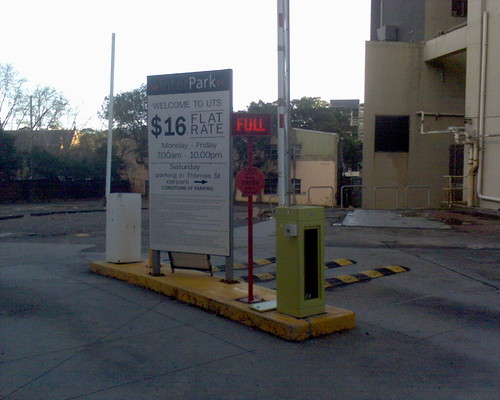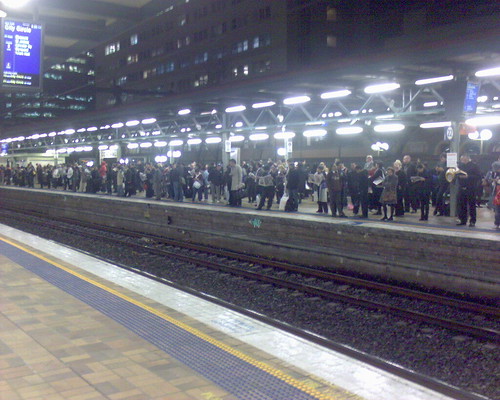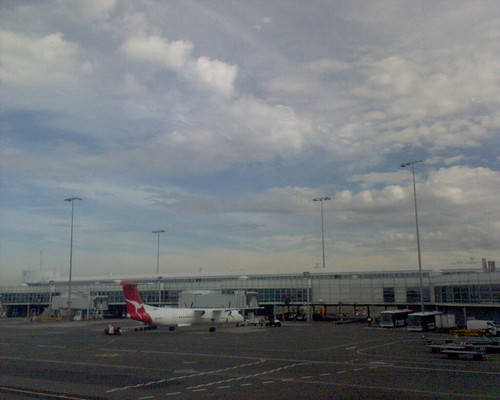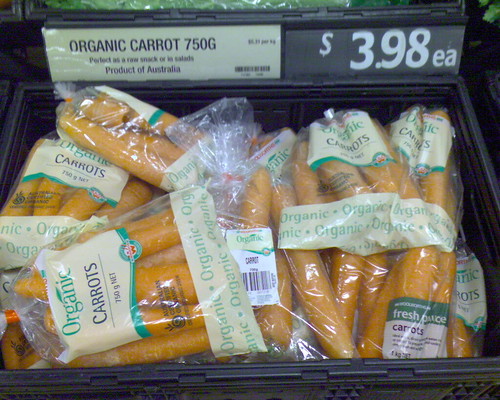Spying the Ferris wheel over the overpass at Darling Harbour.
How full is the car park? (photo)
In the now closed car park beside UTS building 10 the sign declares it full. Perhaps the sign is thinking back to better days, when many a uni student and staff member would park there for the day? Or maybe it has its invisible friends there to keep it company?
links for 2010-07-20
-
A long row of people stand on platform 22 at Central Station, Sydney waiting for the train going around the city circle via St James.
-
Why the Internet filter issue is just a beatup by IT journos. And that the election will be decided by issues that more Australians connect with.
-
Because some parents do not understand the Internet, Professor Matt Warren thinks that the Internet should be censored for all Australians. Dumb down the Internet to cater for the lowest common denominator.
-
Lots of piles of crashed cars on the set of Transformers 3.
-
The Australian Christian Lobby was briefed one day before Labor's major announcement on delaying its controversial internet filter plan.
-
On how it was possible that the expert would be able to access pages automatically blocked by all Australian ISPs, the spokeswoman said: "The independent expert will have powers to carry out their job." The government is not saying how much the expert will cost taxpayers. (Or how they will deal with checking 10,000 pages individually)
People on the platform (photo)
A long row of people stand on platform 22 at Central Station, Sydney waiting for the train going around the city circle via St James.
links for 2010-07-18
-
Looking out the windows of Kingsford Smith Airport's domestic terminal at planes of fluffy white clouds and blue sky peeking through.
-
If video killed the radio star, then downloads may in turn kill the video. The advent of Foxtel IQ, Telstra's T-box and fetchTV, which allow movies to be downloaded on demand, threatens to render the local video store redundant.
-
New research suggests that misinformed people rarely change their minds when presented with the facts — and often become even more attached to their beliefs. The finding raises questions about a key principle of a strong democracy: that a well-informed electorate is best.
-
"Trading in shares on the stock market requires certain skills and expertise and to expect this from deities would not be proper," judges P.B. Majumdar and Rajendra Sawant said, according to Indian newspapers.
-
About the beatup and FUD behind cybercrime.
-
While preaching is not allowed in Australian public schools, it is apparently fine to replace school counsellors with 'Christian Volunteers' such as Darryl.
Clouds at the airport (photo)
Looking out the windows of Kingsford Smith Airport’s domestic terminal at planes of fluffy white clouds and blue sky peeking through.
links for 2010-07-17
-
Trying to be green and buy organic? Or maybe just trying to avoid all the chemicals use in food production? Doesn't it seems just a little ironic to find
-
ABC's site about the 2010 Australian Federal election.
-
Suing tens of thousands of accused peer-to-peer movie file-swappers—it can be a lucrative business model, but it works well only when Internet service providers can turn huge lists of IP addresses into real names and addresses in a timely fashion. But what if a major ISP like Time Warner Cable only had to do 28 of these lookups a month? And might take three years to burn through its entire list?
-
"Somebody said last week that the Greens are more Labor than Labor, more Liberal than the Liberals and unsurprisingly greener than both," Mr Brown told Sky News.
-
The discovery that Google was intercepting wireless data made headlines around the world. But curious "wardrivers" say home networks have long been vulnerable.
-
The level of secrecy shrouding the EU’s ACTA negotiations reached new heights earlier this week, with the news that Pirate Party MEP Christian Engstrom felt compelled to abandon a meeting with ACTA negotiators in the European Parliament after he was forbidden from sharing information with the public.
-
World News Australia – Japan trials billboards that watch you Digital advertising billboards being trialled in Japan are fitted
Go organic with plastic at Woolworths
Trying to be green and buy organic?
Or maybe just trying to avoid all the chemicals use in food production?
Doesn’t it seems just a little ironic to find your organic carrots are sealed in plastic?
I suppose it is to keep them separate so they don’t contaminate all the ‘normal‘ carrots.
links for 2010-07-16
-
Digital advertising billboards being trialled in Japan are fitted with cameras that read the gender and age group of people looking at them to tailor their commercial messages.
-
Maslow’s classic hierarchy of needs has now been updated and adapted for the Internet age
-
A Senate Committee has censored a link to a morally-ambiguous parody on the US TV show Family Guy that was included in a written submission by prominent anti-filter campaigner Mark Newton.
links for 2010-07-15
-
A document has been making the rounds showing that the RIAA paid more than $16 million to its lawyers while recouping only a fraction of it through settlements. While some might grin at this seemingly unfavorable outcome for the music industry representatives, the RIAA told TorrentFreak that the overall result of their efforts in court are in their favor.
-
Sadly for us poor voters, we all know that no matter how much trust we invest in our elected officials, they won't return the favour by investing trust in us.
-
Researchers discover a surprising threat to democracy: our brains
-
An online line vote about the filter run by a large number of media outlets.
-
Mandatory Internet censorship, and for that matter voluntary censorship, will not protect children in any impactful sense. While voluntary censorship fixes some of the problems of the mandatory model, the overwhelming preponderance of content which it is illegal to possess is still not published on the open web but rather inside of secret networks of criminal associates.
-
The Chinese Communist Party has detailed its ambitious but secretive strategy for transforming the internet into a force for keeping it in power and projecting ''soft power'' abroad.
-
China, in the opinion of many, has the most extensive Internet censorship system in the world. The government has spent tens of millions–perhaps hundreds of millions–of dollars on filters and other blocking devices to prevent the spread of information over the Internet.
-
Ms McMenamin of Child Care thinks it great that ISPs will voluntarily implement filters. Though the time frame for implementation is set to be close to 1 year.
-
The is division amongst ISPs. Telstra, Optus and iPrimus want to implement a "voluntary" filter (though only voluntary to ISPs). And Internode and TPG want no part in it.
-
Aside from the political and moral justifications for or against
censorship, what Australian internet users are faced with here is
either submission to a capricious, incompetent and ineffective censor
that blocks content largely at random, or blind rubber-stamping of
any vaguely risqué URLs nominated by anonymous complainants.
Either of those alternatives is a nightmare.





